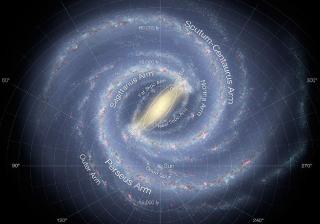Bibcode
Gutiérrez, C. M.; López-Corredoira, M.
Referencia bibliográfica
The Astrophysical Journal, Volume 835, Issue 1, article id. 111, 10 pp. (2017).
Fecha de publicación:
1
2017
Revista
Número de citas
16
Número de citas referidas
16
Descripción
We have analyzed a sample of 327 clusters of galaxies, spanning the
range of 0.06–0.70 in redshift. Strong constraints on their mean
intracluster emission of dust have been obtained using maps and catalogs
from the Herschel MerMES project; within a radius of 5 arcmin centered
in each cluster, the 95% C.L. limits obtained are 86.6, 48.2, and 30.9
mJy at the observed frequencies of 250, 350, and 500 μm. From these
restrictions, and assuming physical parameters typical of interstellar
media in the Milky Way, we have obtained tight upper limits on the
visual extinction of background galaxies due to the intracluster media
(ICM): A V (95% C.L.) ≲ 10‑3 mag.
Strong constraints are also obtained for the mass of such dust; for
instance, using the data at 350 μm we establish a 95% upper limit of
<109 M ⊙ within a circle with a radius of 5
arcmin centered in the clusters. This corresponds to a fraction of the
total mass of the clusters of 9.5 × 10‑6, and
indicates a deficiency in the gas-to-dust ratio in the ICM by about
three orders of magnitude in relation to the value found in the Milky
Way. Computing the total infrared luminosity of the clusters in three
ranges of redshift (0.05–0.24, 0.24–0.42, and
0.42–0.71) and two ranges of mass (<1014 and
>1014 M ⊙), respectively, a strong
evolution of luminosity in redshift (L ∼ z 1.5) for both
ranges of masses is found. The results indicate a strong declining in
star formation rate with time in the last ∼6 Gyr.
Proyectos relacionados

Morfología y dinámica de la Vía Láctea
El Proyecto se estructura en dos partes, diferenciadas pero complementarias: morfología y dinámica. El estudio detallado de la morfología de la Vía Láctea pretende proveer una base de datos de distribución estelar en las regiones más alejadas y extintas de nuestra Galaxia, mediante el desarrollo de modelos semiempíricos a partir de la información
Martín
López Corredoira